Quid Pro Quo for Belarus
Adelina Marini, October 4, 2011
 Although it had no representative at the summit of the European Union and the Eastern Partnership countries, Belarus was in the spotlight of the summit, which ended with a Warsaw Declaration for all and a separate text for Belarus. From the words of Polish PM Donald Tusk, who hosted the summit in Warsaw on 29-30 September, as well as from the European Commission chief's statement it becomes clear that there was a lot of controversy surrounding the final document.
Although it had no representative at the summit of the European Union and the Eastern Partnership countries, Belarus was in the spotlight of the summit, which ended with a Warsaw Declaration for all and a separate text for Belarus. From the words of Polish PM Donald Tusk, who hosted the summit in Warsaw on 29-30 September, as well as from the European Commission chief's statement it becomes clear that there was a lot of controversy surrounding the final document.
A modernisation package for Belarus, but ...
In Mr Tusk's words at the news conference after the event on Friday, the Polish 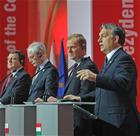 Presidency of the EU had the ambition at this summit the idea of a package for modernisation for a democratic Belarus to be discussed. The plan is developed by EU experts together with representatives of the civil society in the country. The package has to contain an array of tools aimed at stimulating Belarus, including the authorities of the country, for democratisation and reforms, the Polish premier explained. He added that it was not impossible grants and loans to be provided too from international financial institutions, including the International Monetary Fund and the European Investment Bank, amounting up to $9bn.
Presidency of the EU had the ambition at this summit the idea of a package for modernisation for a democratic Belarus to be discussed. The plan is developed by EU experts together with representatives of the civil society in the country. The package has to contain an array of tools aimed at stimulating Belarus, including the authorities of the country, for democratisation and reforms, the Polish premier explained. He added that it was not impossible grants and loans to be provided too from international financial institutions, including the International Monetary Fund and the European Investment Bank, amounting up to $9bn.
Belarus's economy is in a dire situation, the Belarusian rouble has collapsed to the dollar and although Minsk had requested financial assistance precisely from the IMF, because of the conditions the Fund put before the Belarusian authorities they decided to accept the hand of the Eurasian Economic Community (EurAsEC) and borrowed 3bn euros. Donald Tusk continued by explaining that the idea of the package was to provide incentives and investment mechanisms, the purpose of which was to stabilise the Belarusian currency. The package of gifts of the European Union includes also a visa facilitation mechanism.
 But if you think that Santa Klaus had prepared a bag full of gifts for Belarus, there are conditions too. As Tusk explained this package would be put on the table in return for a full amnesty and rehabilitation of all the prisoners detained after the December election last year; launching negotiations with the opposition and holding parliamentary elections under the OSCE standards. At the presidential elections in December 2010 the OSCE observers were expelled from the country. The Belarusian opposition, which had representatives in Warsaw and held meetings with representatives of the European institutions and the Polish Presidency, was also duly informed about the exchange deal. It is not clear, however, what will be Minsk's reaction, who played a typical theatre of absurd and did not send a representative at the summit.
But if you think that Santa Klaus had prepared a bag full of gifts for Belarus, there are conditions too. As Tusk explained this package would be put on the table in return for a full amnesty and rehabilitation of all the prisoners detained after the December election last year; launching negotiations with the opposition and holding parliamentary elections under the OSCE standards. At the presidential elections in December 2010 the OSCE observers were expelled from the country. The Belarusian opposition, which had representatives in Warsaw and held meetings with representatives of the European institutions and the Polish Presidency, was also duly informed about the exchange deal. It is not clear, however, what will be Minsk's reaction, who played a typical theatre of absurd and did not send a representative at the summit.
In the Warsaw Declaration, however, the leaders of the 27 member states express a deep concern from the deteriorating situation with the human rights, democracy and rule of law in Belarus, deplore the continued deterioration of media freedom in the country and call for the immediate release and rehabilitation of all political prisoners. Besides, in the brief declaration dedicated to Belarus only, the EU member states express a deep concern of the reports that prisoners are being denied access to their families and lawyers, as well as to medical care, while in the same time they are subject to psychological and physical pressure.
"The European Union has consistently offered to deepen its relations with  Belarus and, while reaffirming its policy of critical engagement, reiterates that such a deepening is conditional on progress towards respect by the Belarusian authorities for democracy, the rule of law and human rights", the declaration states.
Belarus and, while reaffirming its policy of critical engagement, reiterates that such a deepening is conditional on progress towards respect by the Belarusian authorities for democracy, the rule of law and human rights", the declaration states.
Still there is no official reaction on Belarus's side to the declaration, and also to the idea for a modernisation package but on Belarusian Presidency's website it is reported that on October 1st Alexander Lukashenko had signed a decree to pardon another participant in the opposition protests on December 19. Among the birthday greetings and forthcoming meetings it is written: "Guided by the principles of humaneness, President Alexander Lukashenko has granted pardon to another individual convicted for having participated in the street riots on 19 December 2010 in Minsk. The relevant decree was signed by the Head of State on October 1". In the report it is not elaborated who the pardoned opposition member is.
European Commission President Jose Manuel Barroso was very frank when saying at the joint news conference in the end of the summit that he hoped Belarus to be included in the joint declaration but "for some reasons this was not possible". His  words point to the conclusion that there were serious debates on the matter in the room. "I would like to highlight, however", Mr Barroso went on, "that from the different interventions in the room I think we can say that probably there are differences on the methods but we all share the same goal, that of a democratic and free Belarus closely associated with the other partners of the region and of course with all the members of the European Union".
words point to the conclusion that there were serious debates on the matter in the room. "I would like to highlight, however", Mr Barroso went on, "that from the different interventions in the room I think we can say that probably there are differences on the methods but we all share the same goal, that of a democratic and free Belarus closely associated with the other partners of the region and of course with all the members of the European Union".
From the package proposed by the Polish Presidency it becomes clear that the EU is practically acknowledging its impotence to exercise influence on the dictatorial regime of Alexander Lukashenko but it plays the economic card. Experience with such regimes shows though, that the welfare of the ruled peoples by them, although stated as a priority, is in no way a major goal for them. The main goal is remaining in power, but this is something the EU cannot influence upon, aside from stating and providing support for the opposition when it has an opportunity for that. It is important to note, however, that as in the declaration, so in the media statements of EU's representatives it is emphasised that this support will not be unconditional. As President Van Rompuy admitted: "But we cannot re-engage fully with Belarus without clear progress towards democratisation and respect for human rights". Donald Tusk, on his part, said that Europe had left no illusions for anybody.
Enlargement to the East
It is hardly to be found a more inappropriate time to mention the word 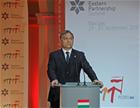 'enlargement' than the current moment, no matter what kind of enlargement do we mean. In spite of the euro area crisis and the failed Schengen enlargement, Hungary's Prime Minister Viktor Orban, who was himself accused in his country of ruling with a firm hand, made an extremely utopian statement, saying that Poland had a mission and that mission was the enlargement of the EU to the East. "I know that this statement is brave because enlargement to the east is a remote topic. We know that this cannot happen over night but let me remind you that, when we joined the EU, it took us 14 years after the fall of communism. The enlargement, perhaps, may be a remote project but this is not going to happen spontaneously. Somebody has to work on it. And who's going to work on it? Poland", the Hungarian premier said, who was a co-host of the summit.
'enlargement' than the current moment, no matter what kind of enlargement do we mean. In spite of the euro area crisis and the failed Schengen enlargement, Hungary's Prime Minister Viktor Orban, who was himself accused in his country of ruling with a firm hand, made an extremely utopian statement, saying that Poland had a mission and that mission was the enlargement of the EU to the East. "I know that this statement is brave because enlargement to the east is a remote topic. We know that this cannot happen over night but let me remind you that, when we joined the EU, it took us 14 years after the fall of communism. The enlargement, perhaps, may be a remote project but this is not going to happen spontaneously. Somebody has to work on it. And who's going to work on it? Poland", the Hungarian premier said, who was a co-host of the summit.
Initially the summit with the Eastern Partnership (it was decided the summits to take place every two years) had to be during the Hungarian EU Presidency, in the first half of 2011. For many and various reasons it was postponed.
Further on Viktor Orban explained why in the current, extremely difficult for the EU, economic and political situation the issue of enlargement should not be a taboo. According to him, the eurozone crisis was blurring reality but when that crisis was to be overcome a solution to the economic crisis in the EU would have to be found. Because, he said, development was impossible unless the Union was expanding. "If we simply fall stagnant, if we do not expand, then the European economy will simply lose its position in the world competitive economy. And therefore, I think that one of the most important economic projects of the EU is the Eastern Partnership, that perhaps will one of these days merge with the Balkan project", the Hungarian prime minister explained his ambitious vision, while looking for support to his Polish counterpart. However, his statement raises the question whether he sees the accession of the Western Balkan countries to the EU with some of the Eastern Partnership nations, or something else.
In order to mitigate the shock from his bold idea, Mr Orban underscored that it was necessary to avoid a repetition of the mistakes from the times of the previous EU enlargement, when the citizens of the old member states were terrified from the possibility millions of eastern Europeans to flood their countries. "Now we have to say very clearly that expansion is inevitable, the expansion of the EU for the good being of the European Union and it is in the economic interest of every simple citizen".
 Alas, although we can describe the summit in Warsaw as a success, it did not give off such an ambition. Moreover that the host had to apologise to Georgia, Moldova and Ukraine for their unmet expectations. "We are aware of the fact that Georgia, Moldova and Ukraine had hopes for this summit, greater than we were able to achieve today - hopes related to a clear perspective for membership. I understand that today we do not have the sufficient conditions to be able to provide such a perspective - both on the EU side and the side of these countries. But we would like these conditions to be met as quickly as possible", the Polish premier said quite sincerely.
Alas, although we can describe the summit in Warsaw as a success, it did not give off such an ambition. Moreover that the host had to apologise to Georgia, Moldova and Ukraine for their unmet expectations. "We are aware of the fact that Georgia, Moldova and Ukraine had hopes for this summit, greater than we were able to achieve today - hopes related to a clear perspective for membership. I understand that today we do not have the sufficient conditions to be able to provide such a perspective - both on the EU side and the side of these countries. But we would like these conditions to be met as quickly as possible", the Polish premier said quite sincerely.
Who gets what?
Three countries loom up as excellent performers out of the six nations in the Eastern Partnership group. This is why the Polish host explained that consent was achieved in Warsaw the negotiations on the first of its kind Deep and Comprehensive Free Trade Agreement (DCFTA) with Ukraine to be signed by the end of the year, and negotiations on such agreements to start with Georgia and Moldova. The problem, however, is that, in spite of the ambition of this summit, a concrete commitment has not been achieved. Moreover, the formulation is in the conditional mood: "We recognised that 2011 is the possible date for the completion with the accession agreement with Ukraine and beginning negotiations of DCFTA with Georgia and Moldova".
Conditionality is bound quite directly and officially to the trial against former  Ukrainian prime minister Yulia Tymoshenko. "I can say that this European adventure of Ukraine and the Ukrainian path towards Europe began in the times of PM Tymoshenko, once she was in power", Tusk added responding to journalists and added that the EU was in constant contact with President Yanukovich as attempts were made to get into contact with Mrs Tymoshenko's representatives. "We have presented to Ukraine a very clear opinion of Ukraine that the bad treatment of the opposition, infringes very gravely such aspirations, and can also hinder and have a negative impact on the possible finale of these negotiations", Tusk added.
Ukrainian prime minister Yulia Tymoshenko. "I can say that this European adventure of Ukraine and the Ukrainian path towards Europe began in the times of PM Tymoshenko, once she was in power", Tusk added responding to journalists and added that the EU was in constant contact with President Yanukovich as attempts were made to get into contact with Mrs Tymoshenko's representatives. "We have presented to Ukraine a very clear opinion of Ukraine that the bad treatment of the opposition, infringes very gravely such aspirations, and can also hinder and have a negative impact on the possible finale of these negotiations", Tusk added.
In the Warsaw Declaration it is written that the pace of reforms will determine the depth of the cooperation between the EU and the Eastern Partnership countries, as well as the individual approach. Judging from the wording of the declaration, the EU is ready to  reveal its cards if the same do its eastern partners. Special focus in the document is put on economic cooperation and visa facilitation. Although no specific commitments are made, nor deadlines, it is pointed out that Moldova and Ukraine are the countries whose implementation of the Action Plans can be a role model for the rest of the countries in the partnership.
reveal its cards if the same do its eastern partners. Special focus in the document is put on economic cooperation and visa facilitation. Although no specific commitments are made, nor deadlines, it is pointed out that Moldova and Ukraine are the countries whose implementation of the Action Plans can be a role model for the rest of the countries in the partnership.
The conclusion from the summit is that, in spite of the lack of specific commitments, it was successful nonetheless - the EU has reaffirmed that it takes its eastern neighbours seriously, but has demonstrated that it depends mainly on them how deep this partnership can be. Of a success speaks the extremely high level of the summit. On behalf of the EU 23 heads of state or government attended the event out of 27 member states. Only Cyprus, Denmark and Italy sent low level representatives, and Britain sent its Deputy Prime Minister Nick Clegg. As already mentioned, Belarus had no representative but, instead, the other five countries from the partnership had a high level representation - presidents or prime ministers.
What the six countries need to understand for themselves is what path they should choose - the easy one, of the status quo, or the difficult one, of reforms and efforts. It is important to know though, that they have an important ally - Poland, of which President Van Rompuy said briefly and clearly: "Poland is a vivid example of what is possible when countries take reform seriously".
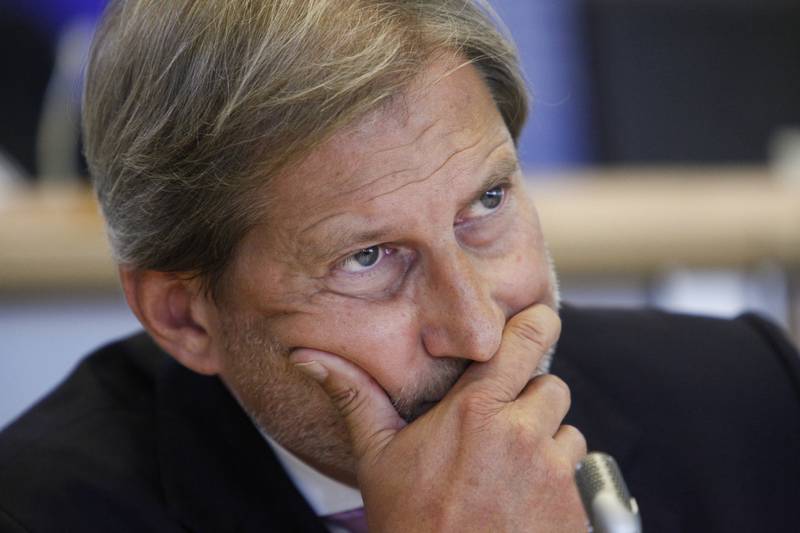 Johannes Hahn | © European Parliament
Johannes Hahn | © European Parliament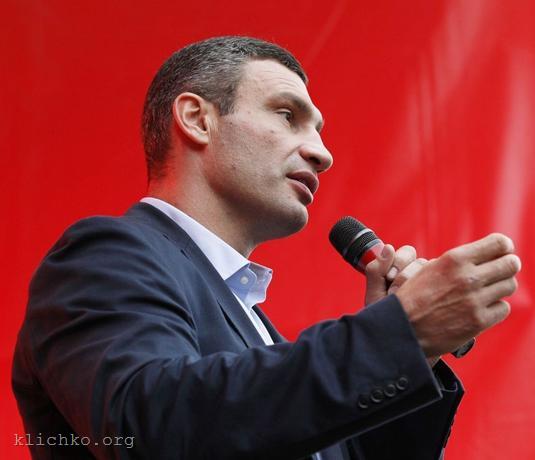 | © klichko.org
| © klichko.org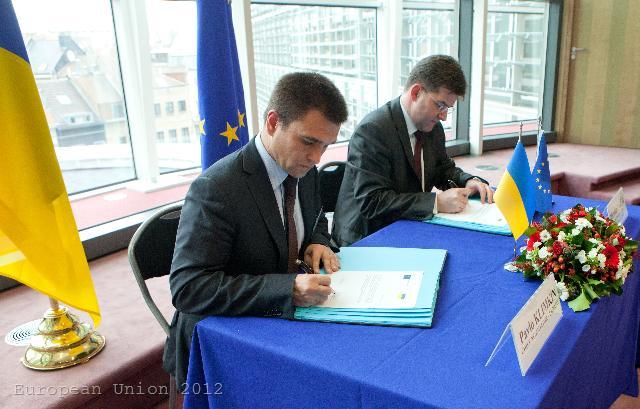 | © European Union 2012
| © European Union 2012